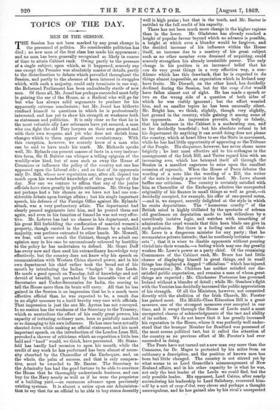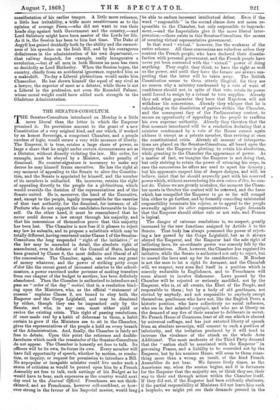feld has hardly had occasion to open his mouth, while
the The Peers have not turned out a new man any more than the credit of any work he has performed has been almost of neces- Commons, for Dr. Magee is protected by his mitre from so sity absorbed by the Chancellor of the Exchequer, and, on sublunary a description, and the position of known men has the whole, the palm of success, and that is only compara- been but little changed. The country is not stirred yet by tire, must be awarded to Mr. Baxter. The Secretary to what seems to us Lord Granville's mismanagement of New the Admiralty has had the good fortune to be able to convince Zealand affairs, and in his other capacity he is what he was, the House that he thoroughly understands business, and can not only the best leader of the Lords we could find, but the buy for the Navy nearly as well as if he were the proprietor only possible leader. His opponent, Lord Cairns, after nearly of a building yard,—an enormous advance upon previously surrendering his leadership to Lord Salisbury, recovered him- existing systems. It is almost a satire upon our Administra- self by a sort of coup d e'tat, very clever and perhaps a thought 'Lion to say that for an official to be able to buy stores decently I unscrupulous, and he has gained also by his rival's unexpected
well is high praise ; but that is the truth, and Mr. Baxter
There has not been much more change in the higher regions- than in the lower. Mr. Gladstone has already reached a. MN IN THE SESSION. height of popular favour beyond which no advance is possible, manifestation of his earlier temper. A little more reticence, a little less irritability, a trifle more sensitiveness as to the opinion of average Peers,—who did not want to run their heads slap against both Government and the country,—and Lord Salisbury might have been master of the Lords for life. As it is, the Session has been to him lost time. The Duke of Argyll has gained decidedly both by the ability and the earnest- ness of his speeches on the Irish Bill, and by his courageous definiteness in the administration of his own department,—, that railway despatch, for example, really inaugurates a revolution,—but of all men in both Houses no man has risen so decidedly as Lord Hatherley. When the Session began, the country, chiefly from an accidental ignorince, regarded him as a makeshift. To-day a Liberal plebiscitum would make him Chancellor. He has shown himself the equal of any rival as a lawyer, the superior of most as a debater, while there is not a Liberal in the profession, not even Sir Roundel' Palmer, whose moral weight could have added such strength to the Gladstone Administration.































 Previous page
Previous page